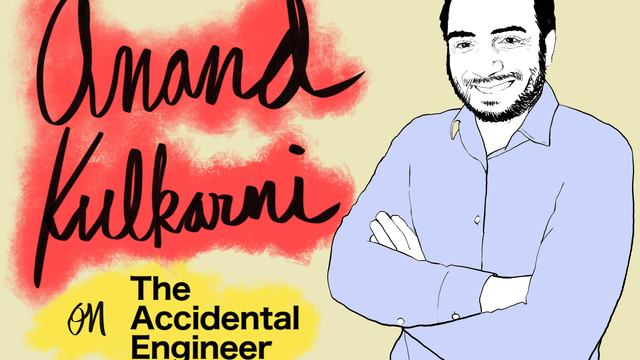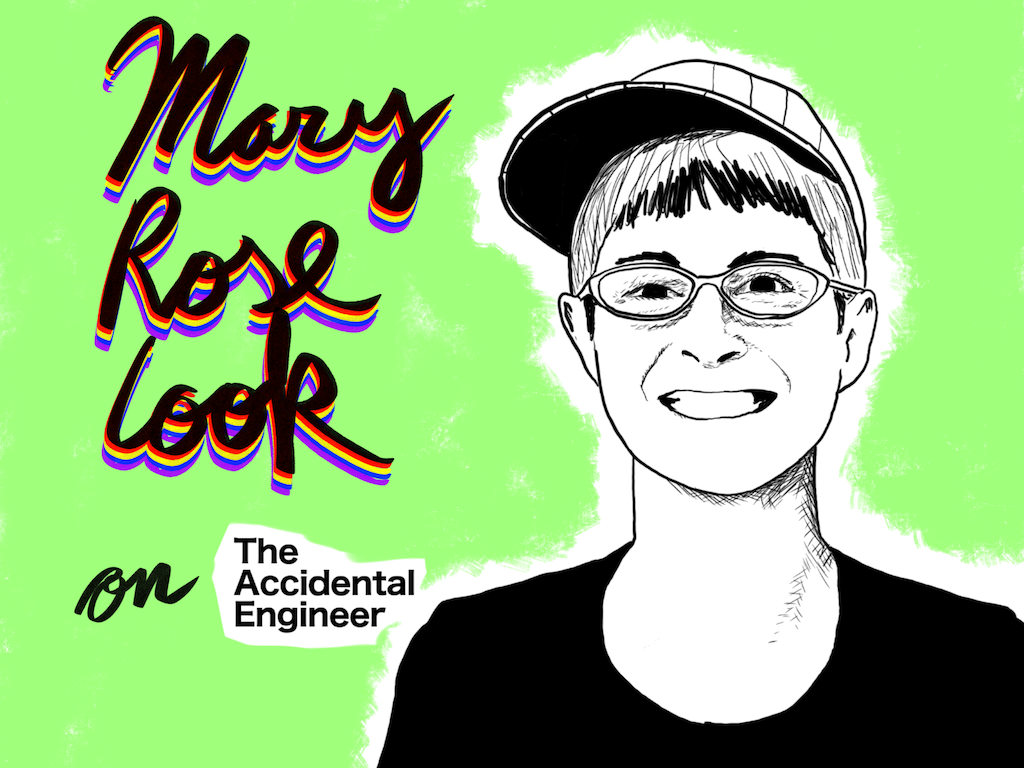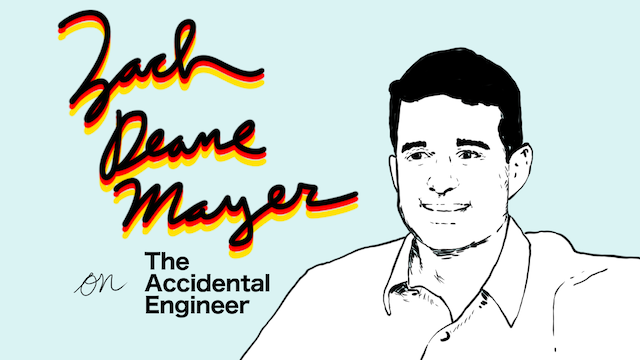Engineering, MBA, and Bridging the Divide with Fede Alvarez
Fede Alvarez del Blanco is in his second year of his MBA degree at UC Berkeley’s Haas School of Business.
Fede comes to the show to share how an industrial engineering undergraduate degree and his MBA have positioned him in the tech job market.
Topics covered include:
- how MBA students schedule their internships and post-graduation jobs,
- what the Boston hardware startup scene looks like,
- why Arab wealth funds are investing into tech and how Fede got involved!
For the full text transcript see below the fold:
Audio:
Play in new window || Download
Video:
Mark: Welcome, all! Max of the Accidental Engineer here. Today we’re joined by Fede Alvarez. Welcome!
Fede: It’s good to be here, Max.
Max: Let me introduce you real quick, and then I’ll give you an opportunity to introduce yourself.
So, Fede, we’re in Berkeley, California today. Fede is going into his second year of his MBA program at Haas at UC Berkeley
Fede: Go bears!
Max: Right on :) And Fede just recently finished his summer internship in his MBA.
Mind introducing people to where you did your internship and what you were doing?
Fede: Yeah. As Max says, I’m at Haas for an MBA which is a two-year program. This summer I worked at iRobot, it’s the largest consumer robotics company in the world with around 60% market share in robotic vacuum cleaners.
It’s very popular for Roomba as one of the main products, and I was working there in the corporate development team helping in some strategy work and also supporting the venture team.
Max: Our audience might not know contextually why you’re such a great guest to have on the Accidental Engineer. One big reason is that you did not do your undergraduate in computer science. You’ve not held jobs in software engineering. However, your undergrad was in industrial engineering.
Fede: Industrial engineering, yep.
Max: We’ve had a couple guests on so far that have done physical engineering degrees in their undergraduate and have ultimately ended up in tech.
For our audience that might be interested in MBAs and getting into tech: mind sharing with our audience how you found your way to an MBA program especially in Berkeley?
Fede: I guess it all started in Spain, where I’m from. I decided to study industrial engineering because in my view it’s a very broad studies. You get to see a lot of math, a lot of physics, a lot of mechanics, a lot of industrial processes. And if you do a bit of specialization, you can even get to understand a bit of the business side.
So I thought it was a very broad study program. At least in Spain and in Europe industrial engineering is very well sought out as a career that can more or less take you anywhere. You can do very technical roles but you can also transition into business roles.
And a very typical career path is to starting consulting, that’s what I did. Because in a very short period of time you can work in different industries with different clients and have a steep learning curve. That’s how my career evolved afterwards. I worked in consulting in the Middle East for four years and then after four years of business experience I really wanted to go back to class and get to learn the theory that I never got the chance to learn back in industrial engineering, right?
It’s proven to be a really powerful experience to sit in a classroom where you’re sitting with 59 other classmates that are very international and have their perspectives on business, discussing business in a very extended period. You have all the time to see it from different points of view, and then bring it back to your experience and relate it to your experience to see, like, “oh, three years ago when I was in that sort of project, or with this client, or I had this sort of management issue, or people issue, this is what I did, what I should have done,” and it’s very, very enriching.
Max: Correct me if I’m wrong, but another reason that I think you chose Haas versus other MBA programs was that 1. you liked Berkeley a lot, and 2. you’re situated and positioned for a job market that is more tech and less consultating?
Fede: One of the good things about an MBA is that it enables transitions, career transitions. Some can be minor, and some career transitions are very wild. So the MBA is a very good platform for a year to think about what you want to do, experiment at that summer internship, get a chance to work for 2-3 months and see if there’s a fit there and then make the decision after the MBA.
That’s one of the reasons I chose Berkeley, because I was starting to think more about the tech space as what I wanted to transition to and this is where the future is being built–in the Bay Area. So I thought that it was going to be a good opportunity to learn about business and network and start to gradually think more carefully about the future ahead.
I think Berkeley is a great place to enable that transition. A lot of my classmates have moved into tech.
Max: Do you mind sharing what percentage of your MBA class is going into tech versus other industries?
Fede: I think that around 30-35% of the class comes from consulting and 30-35% of the class ends up in consulting afterward so there’s a lot of switching there. But tech would be the second or the first in hiring, another 30-35% of the class, I think.
I would feel comfortable saying that 60-80% of the class ends up in consulting and tech. These are the two largest hires.
Max: One of the common attributes of an MBA program is the internship in the summer between the first and second years. Depending on what you want to get into after the MBA there’s a certain amount of hunting that you have to do for that internship. In other cases, employers will come to MBA programs to recruit for some of their internships.
Which was more of the case for you moving into tech coming from consulting?
Fede: It was a bit of both, and it’s very interesting to see how the hiring process works at least in the US for MBA markets because it starts as early as September and it can finish as early as May.
Large companies tend to come very early, the Googles, the Adobes, the Ciscos and they have very structured career progressions or interview processes in which they tend to make offers very early on, around even October, November…
Max: That’s maybe one to two months into your MBA?
Fede: Yeah. That’s actually how it goes. I would say the first one that starts tends to be consulting–people start their interviews around the first week of January if I remember correctly. I wasn’t going to that career path so I don’t know the dates exactly, but in my case I took the first half of the year as more of an exploration. I was trying to work in different areas to build up or confirm my hypothesis that I wanted to go into tech so I would say, yeah, after the first half of the year I did that.
Then I found that there was an enormous amount of opportunities after January, even more than up to December. I think that it’s not an issue to have a…it shouldn’t be a concern to get an offer right away. There’s plenty of time and I feel that the market now is pretty hot in a sense that there a lot of opportunities and the hiring processes are going on pretty quickly, so I feel like there’s a lot of demand for people that are interested and can add some value on the tech space.
Max: So iRobot brought you out to Boston as opposed to the Bay Area?
Fede: Boston, yeah.
Max: Could you give us a sense of how different the job markets are, or the development of the tech industry in Boston in comparison to San Francisco Bay Area?
Fede: Yeah. I was very surprised about that.
First of all at iRobot, it brings great talent. It’s a robotics company so there’s a lot of robotocists, a lot of the hardware engineers and gradually some more software engineers. It’s a very technical company, which I love. As an engineer I love to go around and speak with other engineers. I wasn’t very surprised to see the amount of talent that there is, not only in iRobot but in Boston overall. Obviously having great universities there…
Max: Harvard, MIT…
Fede: You’ve heard of them and the others. They’re really good, and they bring incredible talent. The startup scene as far as I saw is very strong. It’s picking up. There are a lot of very interesting startups emerging in the Boston area. So, I was pleasantly surprised to see that.
Max: Being an MBA intern you were not entering as an engineer, obviously. You mentioned the startups in the Boston area–what were you doing with iRobot over the summer?
Fede: iRobot has a venture arm and is always looking to invest in promising startups that have the potential to add value strategically to the business. So one of the responsibilities that I was doing is analyzing several technologies like 3D imaging, object recognition, and understanding how the industries were evolving. Most importantly, scouting some of the startups.
It was a great opportunity to have conversations with early-on startups–some as small as two to three people and some much larger—and try to understand what the offering was, what their vision was, and to see where they fit within the industry that they were operating in.
I felt that was really, really interesting. I had an opportunity to speak with several CEOs and CTOs which was really enriching, so I really enjoyed that. Again I wasn’t very surprised about the scene in Boston. One of the reasons that I wanted to go to iRobot was because I really wanted to get engage in hardware robots which I’ve had a long tradition with since I was a kid. That was a very good fit there, and I also wanted to test the waters or get to know better the Boston scene. I really loved the Bay Area scene so I wanted to understand better the Boston scene.
Max: A lot of our audience has not done an MBA program and might be thinking about doing an MBA program. You mentioned the percentages of people who ended up in consulting and in tech from UC Berkeley’s MBA program. Is there a certain percent that ends up starting their own businesses?
Fede: There are some percentages, yeah. I would say, less than 5%, which I think is pretty high. The class is 260 roughly. I think the percentage is much larger if you start seeing when they start their company–most of the people found a company 5 years after their MBA. So at the end of MBA I would say less than 5% but the percentage is much higher afterwards.
There’s a lot of entrepreneurship activities and a lot of opportunities to get involved with other entrepreneurs at Berkeley which is really interesting. For example, last year one of the things that I did was help out in a startup that is working with wearables. They were coming from a very technical perspective and we helped them think about their business model, think about their pricing options, and the fundamentals to start off to build the business and that was really interesting. Many other classmates of mine leverage that opportunity to work with other entrepreneurs at Berkeley overall.
Max: I think you’re the first guest we’ve had on that has a very specific interest in hardware tech and I’m curious why that is?
Fede: Yeah, the people that I’ve met tend to be more mechanical engineers, though I’ve seen some software engineers too. I think it comes back to when I was a kid I’ve always been much more attracted to hardware robotics–industrial engineering is a very tangible career. Everything is around mechanics, mechanical elements, industrial processes, industrial plans, things that you can tangibly see as opposed to software which is on the back end, right?
So throughout my evolution I’ve always been much more engaged with products that I can touch and see. That was one of the reasons why I pursued hardware.
Max: Did your undergraduate education in industrial engineering have much crossover, for example, when you were doing your internship this last summer? Any coursework that you can recommend to people who might be in undergraduate right now?
Fede: I think the quick answer to that is “no.” But there is a trick. In my view engineering is a great career and you get to learn how to think analytically about processes and how to structure ideas. In my professional career I’ve applied many of the things that I learned, like I can say that this chapter in this specific class.
It is true that the way that you learn how to solve problems, to not be afraid of numbers, and how to just be very structured in your approach and very analytical. That has been very valuable. And that’s, I think, 80-90% of what you take out of engineering in my view.
I think other people have had more technical careers and in that case you do apply much more of what you learn [in undergrad].
Max: We haven’t really gone into what type of consulting you were doing in the Middle East–that might be an interesting topic to hear about.
Fede: So what I did for around two years is that I worked in strategy for the ops side of businesses across different industries. It was really interesting because back when I graduated in 2012 Spain was still going through a hard economic crisis. I really wanted to go to much larger growth areas, and the Middle East back then when the price of oil was pretty high was growing tremendously.
That enabled me as a fresh graduate to go and work with really big players in the Gulf region that were experiencing a lot of growth. I did two years across the petrochemical industries, mining, even agriculture and even the vehicle industry which was very broad and very interesting.
And then I focused a bit more in the energy space in Dubai. In the Middle East the energy industry is what really moves the needle, and what I mean by “moves the needle” is that is where you see investments in the billion dollar scales. I really wanted to get an experience there and see how do you think around hundreds of millions of dollars of consequences to the decisions you make.
I’ve always liked that strategy work, however I think that the future is tech and the next couple of years probably there’s going to be enormous transitions, so I would like to be a part of that. I’m always thinking about it either from the strategy or the corporate development side, both being pretty interlinked.
Max: One relationship between the work you were doing in the Middle East and the Bay Area in the technology industry that I find really fascinating is the Saudi royal families investing into ride-share companies like Uber, Lyft. It’s an interesting way for them to financially hedge the downside risk of oil prices coming down.
Fede: They’re doing it for several reasons–one of them is that all the countries in the Gulf are very wealthy and they have established these world funds so this is money that the government has that has to allocate it somewhere and get a return so those countries can allocate an investor in their country that’s sort of what the scheme is. So they are putting it in funds that are looking for returns, and one of them is startups obviously–that’s one of the views to get a financial return.
But I think another movement is that they’re gradually trying to bring talent or foster an entrepreneurial mindset. There’s a lot of push to learn about venture capital, learn about entrepreneurship, and get some lessons there as to how they can bring that into their region, too. So I think it’s two-fold.
Max: Before we go, I should mention that you’re soon to be taken off the job market, and that I’m really looking forward to seeing what you’ll do in the next few years because I’m very bullish on that! It would be really cool to do this again in several months.
Thanks for joining us–I appreciate it.
Fede: Thanks Max.


